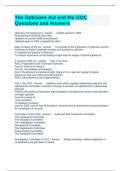Exam (elaborations)
The Opticians Act and the GOC Questions and Answers
- Course
- Institution
The Opticians Act and the GOC Questions and Answers Opticians Act background Initially passed in 1958 Amended several times since then Updated act passed 1989 (amendment) Updated again in 2005 (+supporting rules) Main functions of the act To provide for the registration of opticians an...
[Show more]



